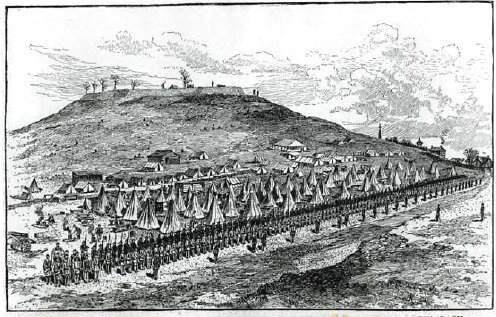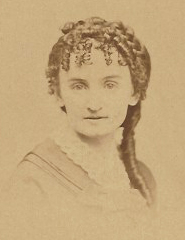
As we know, accompanying the usual physical sufferings from an outbreak of infectious disease are fear and uncertainty, rumors and half-truths, and a search for scapegoats. Such was the case when the 119th U.S. Colored Infantry set up camp near Bowling Green, Kentucky in March 1866. Most of its members were recruited from Lexington, and they comprised one of 23 such volunteer regiments organized in Kentucky between 1863 and 1865.
Unfortunately, the 119th’s presence coincided with an epidemic of smallpox in the town. This appears to have prompted a local newspaper to accuse the African-American troops of introducing or spreading the disease among the citizens. Its editor seemed to have little evidence, however, being satisfied to attribute the contagion only to “careless Negro Soldiery.”
This casual condemnation rankled the detachment commander, Captain William T. Y. Schenck. “What you mean by ‘careless Negro Soldiery’ I do not know,” he wrote the editor, inviting him “or any other person” to visit the camp and inspect it for order and cleanliness. Just “a few inquiries,” he pointed out, would have revealed that “this disease had shown itself in town at least two weeks before we had a single case of it here.” It seemed just as likely that his men had become infected by the local civilians, not the other way around.
Schenck then assured the editor that he had quickly taken steps to “flatten the curve” of infection. Upon learning of the outbreak, he “had all the men vaccinated” and, with few exceptions, allowed no one to leave the camp, “not in fear of the disease being carried from here, as we had none, but if possible to keep it without the limits of this camp.” Despite his efforts, about 20 of the men fell ill, but they were being isolated in a “secluded building” and the threat was now “very much on the decrease.” He concluded with a request to the paper to print his response “in order to do justice before the public to me & my fellow officers.”
A finding aid and typescript for Captain Schenck’s letter can be downloaded here. To browse Civil War collections in the Manuscripts & Folklife Archives of WKU’s Department of Library Special Collections, click here or search TopSCHOLAR or KenCat.


